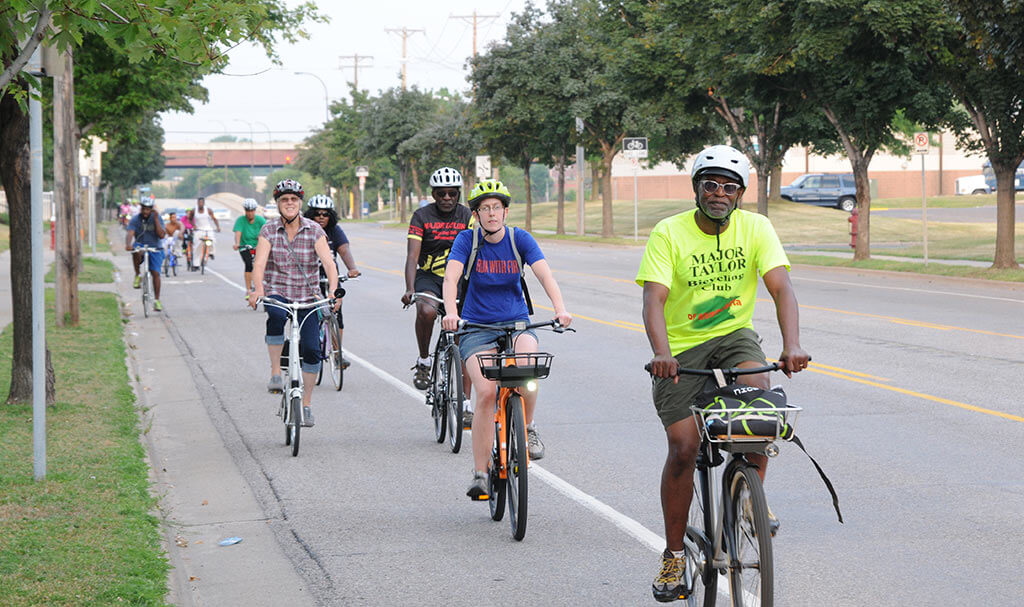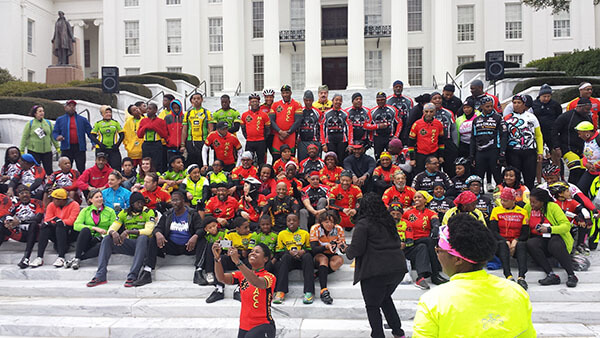Autumn Gear Guide
Find inspiration in our Gear Guide that will keep you out on your bike through wind or rain.
Download NowThe National Brotherhood of Cyclists Conference 2015 encourages diversity in bike advocacy for a vision or a more equitable future.

Photo by Walter Griffin
“We are at the threshold of a movement that really could change the world,” said Anthony Taylor, speaking of the recent groundswell of bicycle participation in Minneapolis, MN, and across the US. While impressive, this surge in everyday cycling still has yet to reach a 10 percent modal share in any city. Taylor, Vice President of the National Brotherhood of Cyclists (NBC) and a prominent advocate in the African-American cycling community, views this low modal share as a positive. To Taylor, it’s a blank slate.
“When you look at the [[transportation]] movement that we had last time when it was about a commitment to cars, it definitely disproportionately affected African-American communities. This time, when we have this mode shift, this transportation change, and this change in the way that we design cities, we won’t create policies that negatively impact any community based on race, gender, income.”
Taylor’s approach to bike advocacy is to acknowledge the historical policies and practices that impacted the communities he works with. The goal is to gain a better understanding of how those policies can be reversed. “All these people, all these communities, all these cities – they come with history,” said Taylor. “The disproportionate crime, the disproportionate obesity, that makes you define the character of the community based on disparities, rather than saying the community that we’re talking about was created, in some regards. When we look at a community, we don’t look at it from a deficit and disparities, we look at it from, ‘Well, how did we get here, and how do we use public policy to create change.'”
He looks at Detroit, MI, with an air of optimism for the future of American cities. While “optimism” wouldn’t be the first word to jump to mind when many people think about Detroit, Taylor argues that, in some measure, Detroit was offered a blank slate. When the manufacturing industry collapsed and took with it many of the city’s residents, what remained was a city built for two million people that is now home to abandoned buildings and empty streets. “What happens when a city loses its people? It loses its cars,” Taylor explained. “So what happens when people re-imagine the possibilities when they’ve lost their cars? All of a sudden you wind up with biking.”

Photo courtesy of Anthony Taylor
He points to the emergence of movements like Slow Roll Detroit – a community bike ride that has since spawned offshoots worldwide – as an example of the kind of equity-based social movements that can develop when people are able to build their communities from the ground up. While bicycling advocacy isn’t new, there is still the opportunity to introduce and solidify equity into the discussion at every level. “There are many, many people coming together and talking about biking,” Taylor said. “But they have not been diverse.”
While discussions around race, gender, and economic status have recently entered the bike advocacy world at events such as the National Bike Summit and World Bike Forum, the amount of space they occupy in the overall movement remains small. Aiming to change this, Taylor and his colleagues at the National Brotherhood of Cyclists are hosting the NBC Conference 2015 from July 15-18, 2015, in Minneapolis. The conference will bring together a number of new, emerging, and prominent bike advocates from around the US with an aim to propel equity to the forefront of the bike advocacy movement.
The conference will include panels and discussions on subjects ranging from women-lead organizing, reducing health disparities in low-income communities, equitable bike shares, and the relationship between bike lanes and gentrification.
Beyond equity, a principle goal of the conference is working towards unity within the bike advocacy community itself. “I think in the traditional advocacy community it’s either one or the other,” said Taylor. “You focus on youth, that’s your thing. Or you’re all transportation. And transportation cyclists don’t talk to the guys who wear Spandex, and the Spandex guys don’t consider themselves advocates, and then it’s a divided effort.”
As a community organization whose roots are in sport cycling, it’s a role the National Brotherhood of Cyclists is uniquely suited to play. The NBC developed organically when a number of predominantly African-American cycling clubs began to connect at events and online, eventually growing into a nationwide community based on mutual support. Taylor noted that, while the clubs are primarily recreational, most of them have an element of advocacy, supporting bike-based community work where they can. “I think there’s a very natural inclination in the African-American community of giving back,” Taylor explained. “You know the theory when you do well you give back to the community, and I don’t think we’ve capitalized on that in bike advocacy very well.”
While the movement is still young and the opportunity still exists to build its future along equitable lines, Taylor hopes to see the emergence of a unified and inclusive movement working towards equity from all directions. “If we’re really going to create great change we have to get our transportation cycling community to connect to our recreation cycling community to connect to those who think that youth are the issue, to connect to those who think that women are the issue,” said Taylor. “However you ride a bike, however you dress, whatever your thing is, then we have an opportunity to unify our efforts. If you ride a bike, you’re part of this.”
The National Brotherhood of Cyclists Conference 2015 will be taking place between July 15th and 18th, 2015 in Minneapolis, MN. The full conference schedule is available here.
Find inspiration in our Gear Guide that will keep you out on your bike through wind or rain.
Download Now
Leave a comment